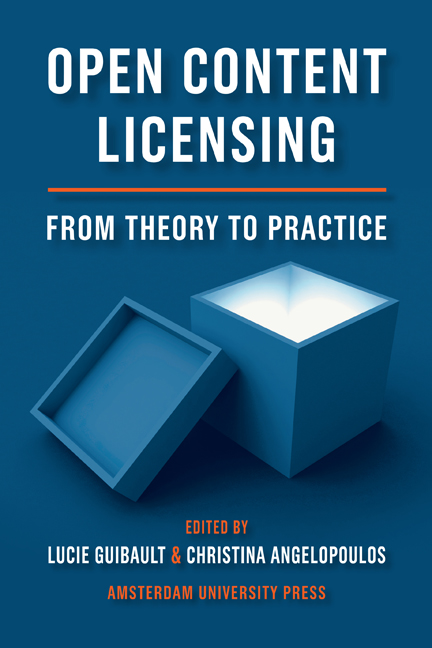Book contents
- Frontmatter
- Contents
- 1 Open Content Licensing: From Theory to Practice – An Introduction
- 2 Towards a New Social Contract: Free-Licensing into the Knowledge Commons
- 3 Is Open Content a Victim of its Own Success? Some Economic Thoughts on the Standardization of Licenses
- 4 (Re)introducing Formalities in Copyright as a Strategy for the Public Domain
- 5 User-Related Assets and Drawbacks of Open Content Licensing
- 6 Owning the Right to Open Up Access to Scientific Publications
- 7 Friends or Foes? Creative Commons, Freedom of Information Law and the European Union Framework for Reuse of Public Sector Information
- 8 Contributing to Conversational Copyright: Creative Commons Licenses and Cultural Heritage Institutions
- 9 Creative Commons and Related Rights in Sound Recordings: Are the Two Systems Compatible?
7 - Friends or Foes? Creative Commons, Freedom of Information Law and the European Union Framework for Reuse of Public Sector Information
Published online by Cambridge University Press: 22 January 2021
- Frontmatter
- Contents
- 1 Open Content Licensing: From Theory to Practice – An Introduction
- 2 Towards a New Social Contract: Free-Licensing into the Knowledge Commons
- 3 Is Open Content a Victim of its Own Success? Some Economic Thoughts on the Standardization of Licenses
- 4 (Re)introducing Formalities in Copyright as a Strategy for the Public Domain
- 5 User-Related Assets and Drawbacks of Open Content Licensing
- 6 Owning the Right to Open Up Access to Scientific Publications
- 7 Friends or Foes? Creative Commons, Freedom of Information Law and the European Union Framework for Reuse of Public Sector Information
- 8 Contributing to Conversational Copyright: Creative Commons Licenses and Cultural Heritage Institutions
- 9 Creative Commons and Related Rights in Sound Recordings: Are the Two Systems Compatible?
Summary
Introduction
Public authorities keep vast amounts of information, the access to which, as the spread of freedom of information laws shows, is rapidly being recognized across the globe as a public right Freedom of Information Acts (FOIA) give statutory rights to access information held by public authorities, typically of the administrative or executive branch of government. Traditionally, however, these laws do not give rights to actually use the information, which in many instances is protected by copyright.
In Europe, Sweden has long been regarded as the champion of transparency, having enacted a right to access information some 200 years prior to Germany, the United Kingdom, Belgium and other ‘third wave’ countries that adopted freedom of information laws only in the past decade or so. Other countries, like the Netherlands, Denmark and France, enacted freedom of information laws in the 1960s and 1970s. Today, comprehensive laws have been adopted everywhere across Europe.
Freedom of information law is, first and foremost, an instrument that helps the effectuate democratic control of public administration, but it is also credited with broader benefits. As the Explanatory Report to the 2008 Council of Europe Convention on Access to Official Documents states:
Transparency of public authorities is a key feature of good governance and an indicator of whether or not a society is genuinely democratic and pluralist, opposed to all forms of corruption, capable of criticising those who govern it, and open to enlightened participation of citizens in matters of public interest. The right of access to official documents is also essential to the self-development of people and to the exercise of fundamental human rights. It also strengthens public authorities’ legitimacy in the eyes of the public, and its confidence in them.
A common feature of freedom of information laws is not just that they give citizens a right to access information on request (‘passive’ access), but also that they lay down a duty for public authorities to make information public at their own initiative (‘active’ access). Spurred by the opportunities that information and communication technologies offer and the desire to make public administration more efficient, citizen-oriented and transparent, public sector bodies have committed themselves to making large amounts of information available electronically.
- Type
- Chapter
- Information
- Open Content LicensingFrom Theory to Practice, pp. 169 - 202Publisher: Amsterdam University PressPrint publication year: 2012



